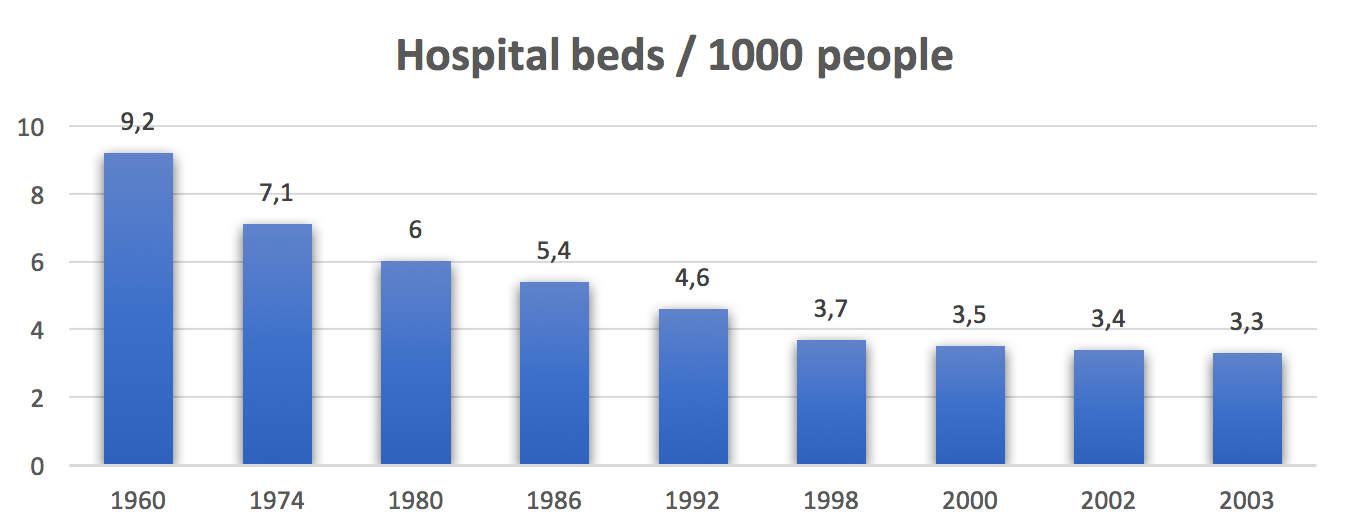6 sites that help you choose the best hospital
Finding the best hospital for any disease can be difficult, even in our times.
According to the most recent statistics, the United States is currently home of approximately 5,600 hospitals. This figure has been constantly decreasing over the past decades, contrary to the steady enlargement of the number of employees in the U.S. healthcare system.
For an accurate depiction of the situation, the graph below reveals the ratio for hospital beds per 1000 people. The data contains treatment spaces available in public, private, general, and specialized hospitals and rehabilitation centers.

Source: http://www.nationmaster.com/
In 1975, the number of hospital beds in the US was exactly 1,465,828. This has decreased to approximately 924,000 until 2011. In 2015, the number fell to a historical level below 900,000, while the U.S. population has seen a steady increase. A comparison between countries and hospital beds per 1000 people places the US in the 80th position worldwide.
Although statistics show a narrower palette of options compared to the ’70s or ’80s, this does not mean that deciding upon a hospital in which to have surgery or to be submitted for long-lasting treatment has gotten any easier for you. There still are a lot of options to choose from and the plethora of information available can make the entire process quite overwhelming. The increase in mobility makes it easier to travel to remote locations to find the perfect hospital, with enhanced facilities, renowned surgeons and good patient reviews.
Factors to consider when choosing a hospital
When conducting research for the best hospital for your disease, there are several factors to consider:
- Does the hospital have a special unit or floor for your type of surgery or treatment?
- Do they have a team of doctors that are specialized and renowned in treating your type of disease?
- Are the operating rooms fitted with special equipment required for your type of surgery?
- Are they invested in offering you every information you need in order to prepare for the surgery (by printing and giving you pamflets, writing a special section on their website)?
- How many patients have they operated on with the same condition as yours?
- How many auxiliary personnel such as nurses are allocated to that unit?
- What is the rate of success they report for this specific surgery? If possible, talk to other patients or check the testimonials on their website.
- Verify if there are reported cases of post operatory infections. A 2015 study at John Hopkins, on patients undergoing colon and rectal surgery, showed that hospitals that focus on quality-improvement solutions (such as getting patients to take antibiotics, encouraging them to drink fluids, cleansing their skin with antiseptics before surgery) report less lengthy recoveries and lower rates of surgical site infection by more than a half, as well as shortened hospital stays.
- Search for photos online of their private rooms, waiting areas, cafeteria, bathrooms, as you and your family will spend at least a few days in there;
- Has integrated an Electronic Health Records System (EHRS) that can track results of lab tests, diagnostics tests or patient referrals.
- Check to see if they have sufficient on-call assistants on holidays, especially if your surgery is planned during that period.
Sites that help you find the best hospitals
Gathering all this information on your own can prove to be overwhelming. Luckily, there are scoring systems put in place that help you quickly analyse one hospital over the other:
- Medicare.gov – the US government provides information and reports on hospitals and doctors, as well as a list of all hospitals in your area (based on ZIP code, city or state). The site also facilitates comparison of 3 hospitals at a time, based on quality measures, distance from the city centre, emergency services, EHRS integration and a safe surgery checklist.
- The Joint Commission Quality Check – is an independent, non-profit organisation that accredits and certifies nearly 21,000 healthcare institutions and programs in the US. Their platform allows you to check if a certain hospital adheres to its performance standards, committing to deliver safe and effective care of the highest quality and value.
- The Leap Frog Group – is also a non-profit organisation that aims to protect patients and their families from errors, injuries, accidents and infections. It reports data on more than 1800 hospitals in the U.S., having programs that regularly survey and grade hospitals for their quality care and procedures.
- Consumer Reports – this site rates each hospital based on their patient safety score, as well as on measures relating to patient experience, outcomes and certain hospital practices.
- Health Grades – Provides statistics on clinical quality for each specialty (incidence of mortality during and after surgery) and patient experience (in terms of overall feedback, cleanliness, staff, doctors, facilities).
- Why Not The Best – tracks performance on various measures of health care quality. Their tool permits comparison of process-of-care measures, patient satisfaction, readmission rates, average reimbursement rates and mortality rates. It also includes data on the incidence of central line-associated bloodstream infections (from over 1500 hospitals), the adoption of electronic medical records, as well as population health, utilization and costs.
Another offline resource you could turn to is your health insurance company. Many insurers have ratings on how hospitals perform the type of surgery you’re having. Ask them if they have a ranking system for trustworthy healthcare providers and, if so, use the information provided to find the best option for your surgery.

